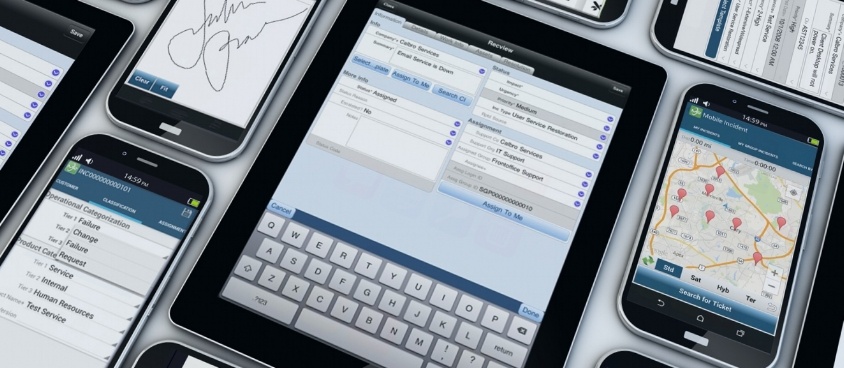07 Aug Field Service Best Practices – Task-Specific Work Order Apps
 Handling field service and work order management with mobile devices presents a number of challenges every day. Task-specific work order apps can help field service managers create a better experience for workers in the field, which translates to a better customer service experience. From tracking work order events in real-time to mainstreaming devices and apps so that everyone can communicate effectively, there are several best practices that can have a positive impact on work order management with mobile apps.
Handling field service and work order management with mobile devices presents a number of challenges every day. Task-specific work order apps can help field service managers create a better experience for workers in the field, which translates to a better customer service experience. From tracking work order events in real-time to mainstreaming devices and apps so that everyone can communicate effectively, there are several best practices that can have a positive impact on work order management with mobile apps.
Usability With Multiple Mobile Devices
Keeping a workforce in the field connected and efficient typically requires integration of mobile apps that can be used with multiple devices. Having apps that allow field workers to use their mobile devices to gather and relay information increases accuracy and improves speed. The use of barcode scanning and radio frequency identification, also known as RFID, creates a number of shortcuts and improvements in field services management.
Scalable
There’s more to creating work order solutions with mobile devices than offering a smartphone to a few employees to use in the field with a cookie-cutter mobile app. The mobile apps must be scalable for them to work efficiently. They should look the same and behave the same on every device for uniform usability and effect. Field workers should be able to connect to other systems on the back end and have real-time capabilities. When the information isn’t updated in real-time, anyone attempting to access or use the data is at a disadvantage.
Communication
Tracking communication among workers in the field and the central point of contact makes work order management more efficient. The devices and apps should operate on the same platform. This requires a standard for communications devices, app integration and their use cases.
Offline Capabilities
One of the latest best practices in field services management that have evolved with modern technology is the ability to uses mobile apps even when assets are temporarily offline. Field technicians need to be able to access and update information specific to what they’re doing. Apps that work offline maximize efficiency, cutting down on the time it takes to complete service calls. This simplifies the process and increases the accuracy of work order management.
Mobile App Efficiency
For maximum efficiency, mobile apps that tie devices to back-end information needed by field techs sometimes offer a cookie-cutter approach. They might have bells and whistles that don’t apply to a company’s work order processes, creating unnecessary steps to complete the job. On the other hand, they might be lacking in functions, requiring time-consuming workarounds to access or provide necessary information. The most efficient mobile apps do exactly what is needed and nothing more.
Performance Management
Where applicable, performance management best practices for field workers go one step beyond simple scheduling. Some apps include the ability to fill out and return electronic forms that are easy to use, offer mobile printing capability and implement GPS. Fieldworkers can put in parts requests, view work orders, provide electronic or printed receipts and report to their next customer ticket location with little fanfare. A GPS can also serve as an identifier to link the order to the location. This is especially helpful for field service management in cases where techs are assisting offline customers or those with incorrect database information.
Bring Your Own Device
The option to BYOD is one facing many businesses today. While it can work to a company’s advantage, it can be detrimental when best practices aren’t implemented. For example, lack of security can result in the compromise of personal data and proprietary company information. Not all mobile apps can be used with all devices, and not all of them have the same capabilities. As a result, the user experience may be different across the board. Implementation of apps and platforms to integrate communications should be standardized for all devices, whether they are furnished by the company or BYOD.
When implemented using best practices, task-specific work order apps can make work order management easier, less expensive and more efficient. Options must be scalable, efficient and work uniformly for field personnel to provide the best usability and performance.
To learn more about mobile apps for field service management, read our comprehensive guide.



